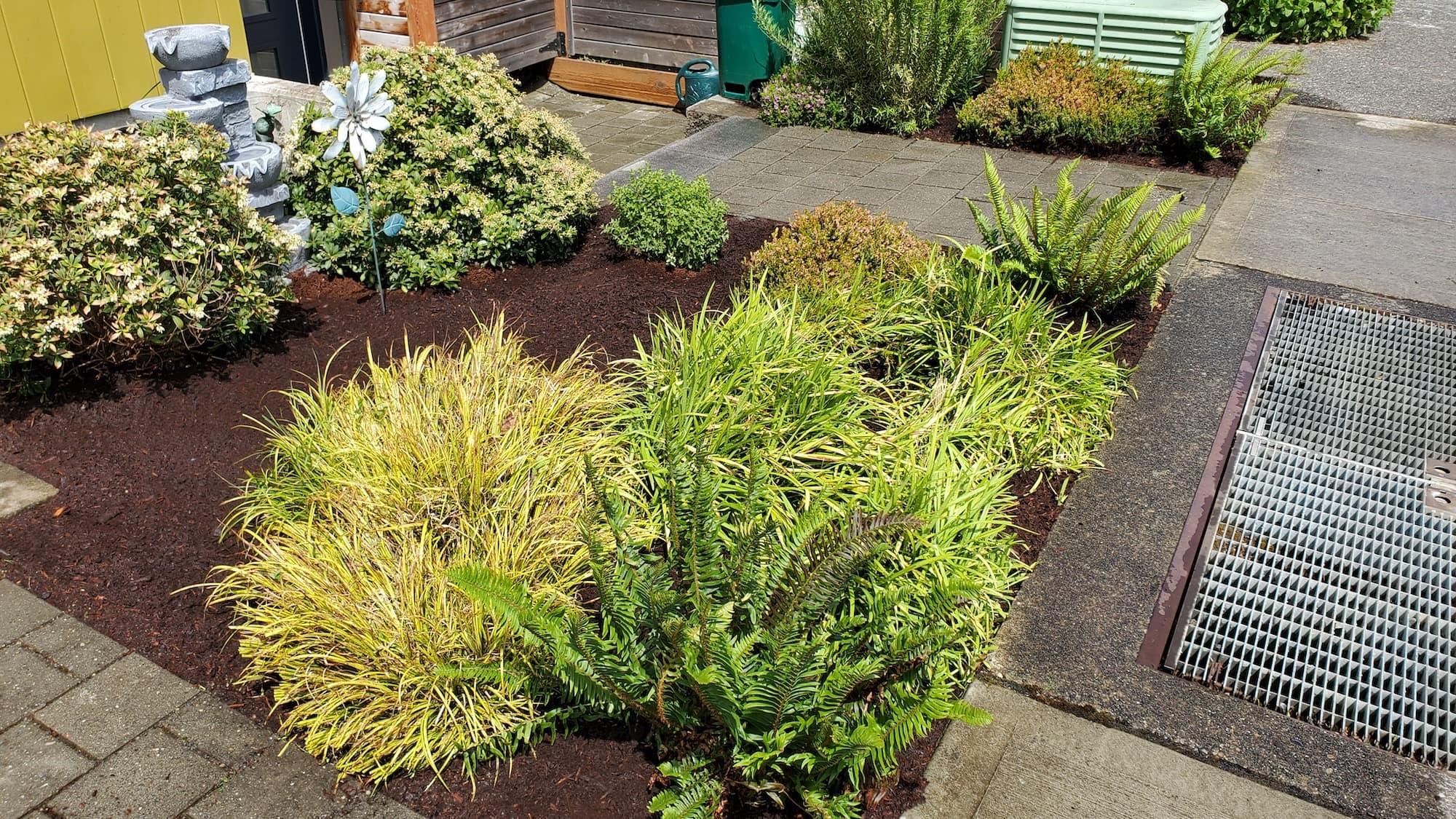West Seattle water pooling near foundation fix
Homeowner’s Issue
West Seattle yards sit under a familiar squeeze: heavy fall and winter rains, compacted fill soils on ridges, and shady slopes that hold moisture long after the rain stops. Many homes—especially near Lincoln Park, Alki, and the Admiral district—were built on reworked soils with clayey lenses or compacted topsoil that slows infiltration. Combine that with downspouts dumping at grade, narrow front yards sloping toward foundations, and old lawns with shallow roots, and you get recurring puddles against foundations and soggy planting beds.
Sun exposure varies block-by-block; north- and west-facing slopes keep soil cool and moss-prone, while south-facing terraces dry faster but can concentrate runoff into a low corner. West Seattle’s roughly 35–40 inches of annual rain means drainage must work year-round, not just summer. Seasonal weeds, English ivy, and blackberry can exploit wet patches, and moss will take hold where soil is acidic and shaded. HOA curb appeal rules in some neighborhoods push owners to keep tidy fronts—so a functional, low-profile solution that respects slope, local runoff patterns, and water restrictions is the right approach. Sustainable fixes—regrading, permeable surfaces, French drains, and rain gardens planted with native shrubs and ferns—solve the problem without herbicides and with minimal long-term maintenance.
Our Quality Service
We inspect the site, diagnose the flow paths, and deliver practical, sustainable fixes. Expect a same-week initial assessment for most West Seattle addresses and 1–3 days on-site for typical regrade + drain installs; larger properties or complex slope repairs may take a week. We use compactors, subsoilers, corrugated drainage pipe with cleanouts, gravel trenches, and native soil/compost blends for amendments. No herbicides—only mechanical removal, mulches, fabric where appropriate, and organic weed control methods.
Local insight we apply: account for glacial till and compacted fill, orient solutions to prevailing winter flows off the ridge, and size drainage to handle consecutive storm days. Benefits include reduced basement seepage risk, cleaner curb appeal for HOA rules, safer yards in wet weather, and lower maintenance with native plant buffers.
What’s Included
- Full property inspection and documented flow diagram.
- Regrading to create 2%+ fall away from foundation where possible.
- Installation of French drains or surface drains tied to safe discharge points.
- Soil amendments: compost blending to improve structure and infiltration.
- Native planting: moisture-tolerant shrubs, sedges, and ferns to stabilize soil.
- Mulch and finishing: clean, weed-suppressing organic mulch.
Options / Upgrades:
- Permeable pavers for walkways and patios.
- Rain garden or bioswale planting with root-zone soil mix.
- Rain barrels for gutter runoff capture.
- Landscape fabric + gravel under paths (where appropriate).
- Haul-away (dump ticket) vs. green bin disposal for yard waste.
Before & After / Expectations
Be realistic: there will be noise, soil movement, and truck access needs. Most small jobs produce about a day of heavy activity and a day for finish grading and planting; bigger jobs require staging and up to a week. We clear and stack removed turf or plant material for client review before disposal. Expect temporary bare soil until plantings establish—typically one full growing season before beds look settled.
Care tips for West Seattle:
- Water deeply during dry spells (July–Sept) for new plantings; weekly soak for first two summers.
- Watch for spring and fall weed flushes; hand-pull or mulch refresh as needed.
- Moss indicates compacted, shaded soil—increase drainage and add coarse mulch to change conditions.
- Keep downspouts directed into gravel-filled trenches or rain gardens rather than at grade.
FAQs
- How long before I see results? Most pooling stops as soon as grading and drains are in place; vegetative stabilization takes a season.
- Will this prevent basement leaks? Proper regrading and a functioning drain dramatically reduce risk, but interior leaks need separate waterproofing.
- Do you use herbicides? No. We use mechanical, thermal, and organic methods only.
- Will you need to tie into city storm systems? We avoid public system connections unless required; if a permit or connection is necessary, we’ll advise you up front.
- Do you handle permits? We’ll advise on permits and can assist with paperwork for larger jobs.
Call to Action
If standing water is creeping toward your foundation in West Seattle, book a free estimate. We schedule fast inspections, recommend sustainable fixes tailored to your lot, and keep projects neat and low-maintenance. Email neatandtidyseattle@gmail.com to get on the calendar—local crews, clear quotes, no surprises.










